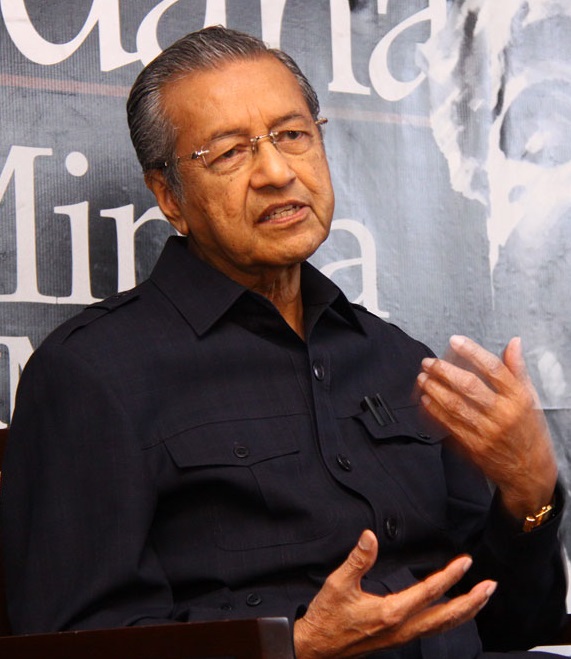Why Malaysia should review its ‘no censorship’ Internet policy
By A.J. Surin May 18, 2015
- There has been no ‘redder flag’ than the Nur Fitri child porn case
- Many questions need to be answered, a few relate directly to the Internet
 WHEN Dr Mahathir Mohamad, the then Prime Minister of Malaysia, announced the creation of the Multimedia Super Corridor (MSC) in the mid-90s, he also assured that the Internet, as it is used in Malaysia, will not be censored.
WHEN Dr Mahathir Mohamad, the then Prime Minister of Malaysia, announced the creation of the Multimedia Super Corridor (MSC) in the mid-90s, he also assured that the Internet, as it is used in Malaysia, will not be censored.
At the time, I was of the opinion that this was a good thing – it would paint Malaysia as a progressive and liberal nation, ready to face the onslaught of new and amazing viewpoints and content coming through and from the Internet.
As of this moment, I’m unsure whether my original viewpoint is sound.
This is because of the recent news about Nur Fitri Azmeer Nordin, a 23-year-old Malaysian, who was caught by British police last November in London with his laptop open, sitting next to a life-sized mannequin of a young boy.
What is worse and nauseating is the fact that London’s Metropolitan Police found that his electronic devices contained more than 30,000 images and videos of children being sexually abused, including 601 images and videos classified as Category A, which is abuse involving penetrative sexual activity with children, as well as hundreds listed under Categories B and C.
Nur Fitri subsequently pleaded guilty to all 17 charges of possessing, making and distributing pornographic images of children. On the day of the sentencing, which was on April 30 this year, the police added seven more pornographic charges, in which a year-old baby was involved.
The judge allowed a sentence of 18 months’ imprisonment against him. Thus, at the latest, he will be deported back to Malaysia on Nov 1, 2016.
One point to make here in the ongoing discussion about the case: Nur Fitri pleaded guilty to those criminal charges. Therefore, if the Government of Malaysia were to appeal his conviction, we may become the laughing stock of civil society throughout the world.
Additionally, it would be a sheer waste of our taxpayer's money to do so, taking into account the heinousness of the criminal offences that Nur Fitri committed and the fact that he pleaded guilty.
Metropolitan Police described some of the images and videos in Nur Fitri's possession as “the most extreme child porn photos” they have ever seen. They had been alerted to Nur Fitri's activities after discovering an Internet account that had been downloading thousands of sexual abuse videos and images.
Nur Fitri was a Mara (Majlis Amanah Rakyat) scholar studying mathematics in Imperial College.
A few questions are thrown up here:
How did Nur Fitri become a paedophile? Was it hardwired into him? Did his predilections commence by something that he saw? Or was his sickening interest latent until it was catalysed by something that he saw?
If the answers to the third and fourth above are in the positive, then what was his source of his visual material? Was it from the Internet?
If the answer to that second question is a positive, then it is my opinion that it is about time the Government review and take stock of the ‘no censorship’ policy that Malaysia has had for so long – for the sake of our children.
We cannot deny that the Internet is the most efficient disseminator of information and content that mankind has ever witnessed in its history. Through it, you can provide information and entertainment to the masses (whether mainstream or niche), make money (whether legally or illegally), disseminate opinion (whether establishment or opposition), as well as to bring people with identical interests together into an online community (whether that interest is good or evil).
Mankind is challenged by the Internet's capability to bring people with an evil interest together into an online community. All a heinous, online community needs to get their activities started is a handful of extremely passionate, or zealous, individuals to light the fire of latent interest which may burn humanity for a long time to come.
 Indeed, Dr Mahathir (pic), in one of his blog postings in August last year, said that he too had changed his mind about the ‘no censorship’ policy for the Internet.
Indeed, Dr Mahathir (pic), in one of his blog postings in August last year, said that he too had changed his mind about the ‘no censorship’ policy for the Internet.
He said that the Internet needs to be censored because freedom, any kind of freedom, will always be open to abuse. He opined that the worst abuses are in the field of morality.
At this juncture, I would like to quote Dr Mahathir, because his words encapsulate exactly how I feel about this matter: “The Internet has played a major role in undermining public morality. Our children are not safe from the kind of filth that the print and electronic media promote. Today any child can access pornography of the worse kind. Children are no longer safe from sexual assault. So are young girls and boys as the Internet arouses the kind of base feelings that we curbed before.”
Besides the first set of questions I posed about Nur Fitri earlier, there are so many questions that are left unanswered from this incident of a Malaysian being convicted of such an extremely perverted crime on a global as well as a national perspective.
I’ll keep my thoughts on the national perspective because my thoughts on the global issues would be too lengthy for this article:
Has there been local, scientific research performed on how online porn is directly and indirectly affecting Malaysians – not only whether individuals are crossing the line from online activity to offline, criminal activity but also how online porn is effecting viewers’ psychology as well as physiology?
What about scientific research on how much the nation is losing as a percentage of the GDP (gross domestic product) or the total, productive hours of addicted individuals involving themselves, online and offline, in their heinous activities;
Has Malaysia developed a comprehensive and current database of known or convicted paedophiles as well as known online traders and consumers of child pornography, operating online or offline in Malaysia?
The police do keep a record of convicts and suspects. However, the record should go further than that – the laws should oblige the police to publish and disseminate the names and locations of these individuals so that the relevant, local community is aware of such individuals in their midst or at the very minimum, to allow members of the public to view and search the database for such individuals.
Currently, the police do not allow interested members of the public to do so. Other countries have laws which provide for a sex offender’s registry to ensure that convicted criminals are not hired in places which deal with or involve children, including nurseries, kindergartens, daycare centres and boarding schools;
Exactly how are the police, the Malaysian Communications and Multimedia Commission (MCMC), the Ministry of Education, the Ministry of Women and Family Development, and other relevant Government agencies working together and cooperating to not only clamp down on consumers and purveyors of child pornography, but, more importantly, to address this very evil, social ill? Is this being addressed at all?
I hope my article serves to call out the elephant in the room because porn has become so pervasive in our society, as has child pornography, its extremely troubling niche.
All this has been facilitated, exacerbated and catalysed by the Internet. Decreasing costs of mobile data, more efficient broadband, smartphones and, most importantly, the online community which is working together to enjoy the fruits of their evil labour, are going to geometrically increase the pervasiveness of online porn, as well as niche porn.
If all of this remains unchecked, at least some individuals are doomed to spend countless hours online inefficiently surfing porn – and there may be the few who will trickle out to indulge in offline, heinous activities.
It must be remembered that the Category A porn in Nur Fitri's possession were, at the very minimum, sexual penetrative acts committed against children and even babies.
Finally, my discussion here is limited to the censorship of child pornography as well as pornography in general because morally, it is wrong.
I think that the Nur Fitri case should raise a red flag with relevant government agencies as well as civil society, and I think that in the history of red flags, there may not be a flag redder than this.
I really hope that any quarter or agency will prove me wrong on this matter. Additionally, the discussions regarding the ‘no censorship’ policy vis-a-vis political discussions, online scams, online ponzi schemes, online gambling and online content piracy is way out of the topic of this discussion, but deserves a whole thesis for a substantial perspective on them.
A.J. Surin is a global expert on cyberpolicy and cybercriminology, and author of the book ‘Cyberlaw & Its Implications’ on the law and policy related to cybercrime, cybersecurity and communications. He is also a partner of a Kuala Lumpur (KL) law firm; and chair of a group of companies located in KL, London, Jakarta and Silicon Valley.
Related Stories:
Internet censorship: You’ve already won, Dr Mahathir
Net censorship: Do the ends justify the means?
Censorship 2.0: Shadowy forces controlling online conversations
For more technology news and the latest updates, follow us on Twitter, LinkedIn or Like us on Facebook.


